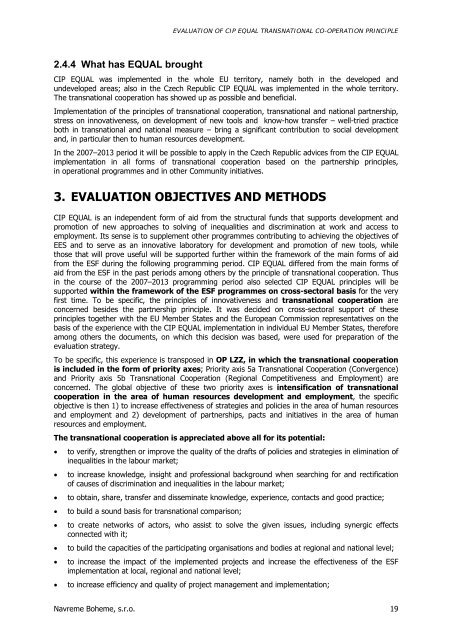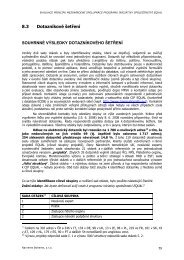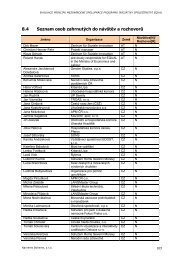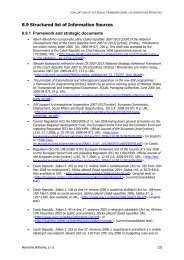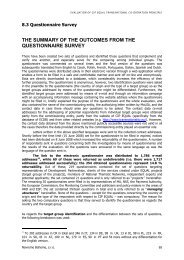EQUAL - Final report - eng - navreme
EQUAL - Final report - eng - navreme
EQUAL - Final report - eng - navreme
Create successful ePaper yourself
Turn your PDF publications into a flip-book with our unique Google optimized e-Paper software.
2.4.4 What has <strong>EQUAL</strong> brought<br />
EVALUATION OF CIP <strong>EQUAL</strong> TRANSNATIONAL CO-OPERATION PRINCIPLE<br />
CIP <strong>EQUAL</strong> was implemented in the whole EU territory, namely both in the developed and<br />
undeveloped areas; also in the Czech Republic CIP <strong>EQUAL</strong> was implemented in the whole territory.<br />
The transnational cooperation has showed up as possible and beneficial.<br />
Implementation of the principles of transnational cooperation, transnational and national partnership,<br />
stress on innovativeness, on development of new tools and know-how transfer – well-tried practice<br />
both in transnational and national measure – bring a significant contribution to social development<br />
and, in particular then to human resources development.<br />
In the 2007–2013 period it will be possible to apply in the Czech Republic advices from the CIP <strong>EQUAL</strong><br />
implementation in all forms of transnational cooperation based on the partnership principles,<br />
in operational programmes and in other Community initiatives.<br />
3. EVALUATION OBJECTIVES AND METHODS<br />
CIP <strong>EQUAL</strong> is an independent form of aid from the structural funds that supports development and<br />
promotion of new approaches to solving of inequalities and discrimination at work and access to<br />
employment. Its sense is to supplement other programmes contributing to achieving the objectives of<br />
EES and to serve as an innovative laboratory for development and promotion of new tools, while<br />
those that will prove useful will be supported further within the framework of the main forms of aid<br />
from the ESF during the following programming period. CIP <strong>EQUAL</strong> differed from the main forms of<br />
aid from the ESF in the past periods among others by the principle of transnational cooperation. Thus<br />
in the course of the 2007–2013 programming period also selected CIP <strong>EQUAL</strong> principles will be<br />
supported within the framework of the ESF programmes on cross-sectoral basis for the very<br />
first time. To be specific, the principles of innovativeness and transnational cooperation are<br />
concerned besides the partnership principle. It was decided on cross-sectoral support of these<br />
principles together with the EU Member States and the European Commission representatives on the<br />
basis of the experience with the CIP <strong>EQUAL</strong> implementation in individual EU Member States, therefore<br />
among others the documents, on which this decision was based, were used for preparation of the<br />
evaluation strategy.<br />
To be specific, this experience is transposed in OP LZZ, in which the transnational cooperation<br />
is included in the form of priority axes; Priority axis 5a Transnational Cooperation (Convergence)<br />
and Priority axis 5b Transnational Cooperation (Regional Competitiveness and Employment) are<br />
concerned. The global objective of these two priority axes is intensification of transnational<br />
cooperation in the area of human resources development and employment, the specific<br />
objective is then 1) to increase effectiveness of strategies and policies in the area of human resources<br />
and employment and 2) development of partnerships, pacts and initiatives in the area of human<br />
resources and employment.<br />
The transnational cooperation is appreciated above all for its potential:<br />
• to verify, str<strong>eng</strong>then or improve the quality of the drafts of policies and strategies in elimination of<br />
inequalities in the labour market;<br />
• to increase knowledge, insight and professional background when searching for and rectification<br />
of causes of discrimination and inequalities in the labour market;<br />
• to obtain, share, transfer and disseminate knowledge, experience, contacts and good practice;<br />
• to build a sound basis for transnational comparison;<br />
• to create networks of actors, who assist to solve the given issues, including synergic effects<br />
connected with it;<br />
• to build the capacities of the participating organisations and bodies at regional and national level;<br />
• to increase the impact of the implemented projects and increase the effectiveness of the ESF<br />
implementation at local, regional and national level;<br />
• to increase efficiency and quality of project management and implementation;<br />
Navreme Boheme, s.r.o. 19


